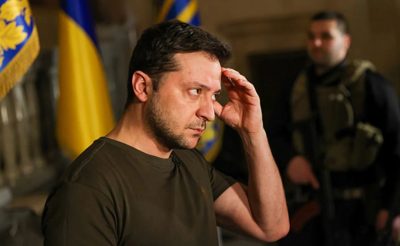Zelensky Cancels Ukrainian Elections to Consolidate His Dictatorial Rule

All Global Research articles can be read in 51 languages by activating the Translate Website button below the author’s name.
To receive Global Research’s Daily Newsletter (selected articles), click here.
Click the share button above to email/forward this article to your friends and colleagues. Follow us on Instagram and Twitter and subscribe to our Telegram Channel. Feel free to repost and share widely Global Research articles.
***
Ukraine President Volodymyr Zelensky announced on November 6 the cancellation of the Ukrainian elections. His cancellation of the elections comes as more and more Western commentators highlight Zelensky’s dictatorial tendencies, which are again on display after cancelling the elections under the guise of needing to concentrate on the war with Russia, a conflict Ukraine has no chance of winning, which again, Western experts are also pointing out.
Presidential elections in Ukraine occur every five years, with the next one scheduled in March 2024 since Zelensky was sworn into office in May 2019, meaning that his five-year term will expire in the coming months. However, with the election approaching, it is evident that Zelensky has instead opted to preserve his dictatorial regime rather than risk losing an election that he will be forced to recognise because of pressure from Washington and Brussels to continue the illusion that Ukraine is a democracy.
“And finally, the waves of any politically divisive things must stop,” Zelensky said after announcing the cancellation of elections. “We must realise that now is the time of defence, the time of the battle that determines the fate of the state and people, not the time of manipulations, which only Russia expects from Ukraine. I believe that now is not the right time for elections.”
“And if we need to put an end to a political dispute and continue to work in unity, there are structures in the state that are capable of putting an end to it and giving society all the necessary answers so that there is no room left for conflicts and someone else’s game against Ukraine,” he added.
It is recalled that Ukrainian First Lady Olena Zelenska said in September that she did not know whether Volodymyr would run for re-election in 2024. Zelenska also said at the time that the country’s ability to organise a free and fair election could factor into whether he would run for a second term.
“It will also depend whether our society would need him as a president, if he will feel that Ukrainian society will no longer wish him to be the president, he will probably not run,” the First Lady said at the time. “But I will support him whatever decision he takes.”
Zelensky, in his announcement, also noted the importance of refraining from grandiose celebrations and divisive political themes during wartime, recognising the suffering and losses faced by the Ukrainian defence forces. He called on all relevant government authorities and structures to work together to address current challenges, including civil authorities, military, legislators, and law enforcement agencies.
“I hope that all relevant structures and authorities will provide concrete solutions to the challenges our country faces today. This applies to civil authorities, the military element of the state, government officials, the Verkhovna Rada, the Security Service and other law enforcement agencies,” said the Ukrainian leader.
In the same announcement on the cancellation of the elections, Zelensky stressed “the need to channel all state resources, budget, attention, emotions and efforts” towards the victory of his country. Zelensky called for allocating budget resources to be prioritised towards defence aid over infrastructure works, stating that this is “the correct approach” to strengthening Ukraine.
Rather, Zelensky is using the war as an excuse to strengthen his power and the regime’s stranglehold over Ukraine. Zelensky’s dictatorial tendencies are beginning to be noticed in the West, with US retired lieutenant colonel Daniel Davis saying that the current situation in Kiev is akin to that just before the collapse of the German Nazi regime.
“During the last days of World War II, Hitler denied reality and kept repeating over and over again: “We will still win.” And now, unfortunately, no matter how unpleasant it would be for us to admit it, Zelensky is falling into the same state,” he said on his YouTube channel.
The expert observes that Zelensky insists that his country’s military has a good chance of triumphing against the Russian troops, yet there are no objective reasons to believe this. Although he makes the analogy with Hitler, he does not delve deeper beyond that.
Nonetheless, at the beginning of the month, Oleksii Arestovych, Zelensky’s adviser to the Office of the President of Ukraine, described the Ukrainian president as a “dictator” who has become “divorced from reality.”
Explaining deeper than Davis, Arestovych said,
“First, someone behaves like a dictator and, instead of following the normal path of accelerated development, chooses stagnation. Then someone breeds massive corruption. Then someone breeds hatred for any opinion different from their own.”
Arestovych’s statements were made before Zelensky announced the cancellation of the 2024 presidential election. It can be expected that with the announcement of the cancelling of the elections, the domestic political front in Ukraine will experience even more fractures.
*
Note to readers: Please click the share button above. Follow us on Instagram and Twitter and subscribe to our Telegram Channel. Feel free to repost and share widely Global Research articles.
Ahmed Adel is a Cairo-based geopolitics and political economy researcher. He is a regular contributor to Global Research.
Featured image is from InfoBrics

